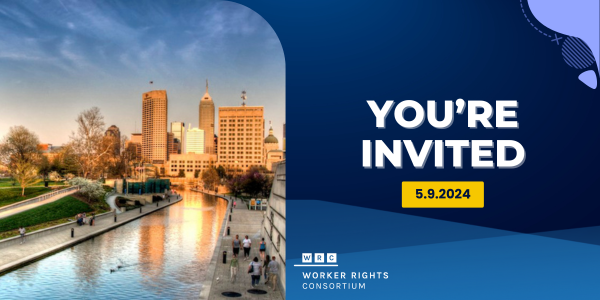Breakfast & Discussion in Indianapolis with WRC


On May 9, the day after CLC Collegiate Licensing Seminar ends, the Worker Rights Consortium (WRC) and our affiliate universities are hosting a conversation about the impact we can have together on the lives of workers in collegiate supply chains.
Before you head home from Indianapolis, please join us for breakfast and a discussion of what universities and the WRC have achieved by working together to implement our licensing codes of conduct—for example, at the Style Avenue factory in El Salvador, where workers will soon receive $1.8 million in legally owed compensation that the factory had failed to pay, the equivalent of at least 18 months of wages for many workers.
If you’ll be in Indianapolis but can’t stay for the breakfast, let us know if you’d like to find a time on Wednesday to talk!
Powerful Partnerships: How Universities and the Worker Rights Consortium Recover Millions in Wages Stolen from Workers
Breakfast & Discussion
Thursday, May 9
Breakfast starting at 8:45 a.m.
Indianapolis Marriott Downtown
Join university licensing directors and WRC Executive Director Scott Nova to discuss how WRC investigators and university licensing professionals have collaborated to win back funds stolen from low-wage garment workers—and how you can be part of the next success. When the WRC finds that factories are stealing wages from the workers who make university logo apparel, we work with university staff and licensees to make sure that the workers’ rights are protected and universities’ commitment to these workers is fulfilled.
The WRC’s strong focus on collegiate apparel—with six board members representing our university affiliates—and our field team on the ground in Asia, the Americas, and Africa make us a leading expert on the challenges universities face in implementing their codes of conduct and the life-changing impact that the codes can have for workers.
We’ll kick off this session answering key questions, such as:
- What can universities do to protect workers and their brand and get ahead of crises?
- How do the WRC and universities engage licensees to reach positive outcomes?
- How can universities build expertise around supply chain compliance?
- What do universities need to do to affiliate with the WRC—or to work together more effectively?
Have a question you want to discuss? Share it with Jessica Champagne.
About the WRC
Founded in 2000 by leading universities, international labor rights experts, and students, the WRC assists universities with enforcement of binding labor standards they have adopted to protect workers producing apparel and other goods bearing university logos. The WRC has 145 university and college affiliates in the United States and Canada. The WRC also works with government entities, including municipal governments and pension funds, seeking to enforce human rights standards.
As an independent labor rights monitoring organization focused on university supply chains, the WRC investigates working conditions in factories around the globe. Our purpose is to document and combat sweatshop conditions; identify and expose the practices of global brands and retailers that perpetuate labor rights abuses; and protect the rights of workers who make apparel and other products.
The WRC conducts independent, worker-centered investigations; issues public reports on factories producing for major brands; and aids workers at these factories in their efforts to end violations and defend their workplace rights. The WRC has investigators in twelve countries and works with hundreds of civil society organizations in Southeast Asia, East Asia, South Asia, Latin America and the Caribbean, and sub-Saharan Africa.
